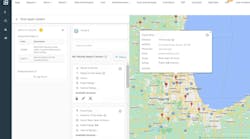Goodyear tires with DuraSeal technology are making flats a thing of the past on the City of Windsor's four street sweeping trucks. Last year, reports Garry Olson, fleet coordinator, Dept. of Public Works, City of Windsor, Ontario, the street cleaning fleet had just one flat using the new technology tires, an unprecedented number on a group of vehicles that previously averaged two to three a day.
According to Olson, the Goodyear G287 MSA 11R.22.5 tires with DuraSeal technology have worked out so well on the sweeper fleet, the city is now starting to put them on the steer axles of some of its refuse trucks as well.
“The reason we chose the sweepers first for a trial run with the new tires is that due to the nature of their job, these vehicles tend to get the most flats,” Olson explains. “We're a fairly large city and from spring until fall, the sweepers are out clearing the roads of all kinds of debris, including rocks, glass and nails.
“Our downtime and tire repair costs before switching to the new tires were astronomical,” he adds. “By the end of this year, however, we'll have gotten three years out of the first set of DuraSeal-technology tires we purchased from our Goodyear dealer, TWS (now Benson Tires). With results like that, it's easy to justify the $145 per tire additional cost.”
Olson estimates that the city is saving between $20,000 and $25,000 a year on tires and tire-related costs since switching. DuraSeal technology uses a gel-like, solvent-free compound built into the inner liner of the tire. This substance is designed to seal itself around punctures up to 1/4-in. in diameter, as long as the puncture is in the repairable tread area and not the sidewall.
“If the new DuraSeal technology tires keep showing the same good stats, we plan to put them on our recycling and one- and two-man packer (side- and rear-load refuse) trucks as well. While we've had success with trials of the tires on the fronts of some of our refuse trucks, we haven't gone to the rears yet. First, we need our drivers to increase their efforts to prevent sidewall tire damage caused by hugging curbs too closely during pickups. A fleet supervisor is working with the drivers now on that issue.”
Checks of the solid waste fleet, Olson reports, show that on average, 12 to 17 tires per week are being replaced due to flats, sidewall damage, and wear and tear. Windsor currently has eight rear- and 15 side-loading refuse trucks, along with nine recycling trucks.
The units are part of the city's fleet of 458 wheeled units comprised of a variety of makes such as Ford, GM and Chrysler. “Freightliner has been the primary low bidder for the larger trucks we use in the fleet, like the sweepers and refuse trucks, although the last three road salter units we purchased were Sterlings,” Olson points out.
Olson notes his department works in conjunction with the Essex County Waste Authority. “While we operate and maintain the refuse trucks, they own the units. For all other fleet operations, we own the equipment and lease it out to the various departments on an hourly basis. We maintain all of the city's fleet vehicles except fire, police and transit.”
The city has two maintenance shops. At Olson's west-side facility, there is 54,000 sq. ft. of garage space, including a stockroom and tire repair shop. The second facility, run by the city's Environmental Services Dept., is responsible for street sweeping and solid waste pickup, among other things. At this facility, routine maintenance and minor repairs are made.
“We have a total of 18 mechanics; eight maintainers (semi-skilled positions), who do things like oil changes, grease jobs, minor repairs etc.; two welders; two body repair persons; three stock keepers; and three supervisors,” Olson states. “The east-side shop is a six-day/24-hour operation, while at my location we work four days a week, from 6 a.m. until 10 p.m.”
With a population of 209,000 and some 1,800 km of roads to maintain, the Public Works Dept. has plenty to do. Thanks to Goodyear, tires are at least one area where costs are being controlled.


